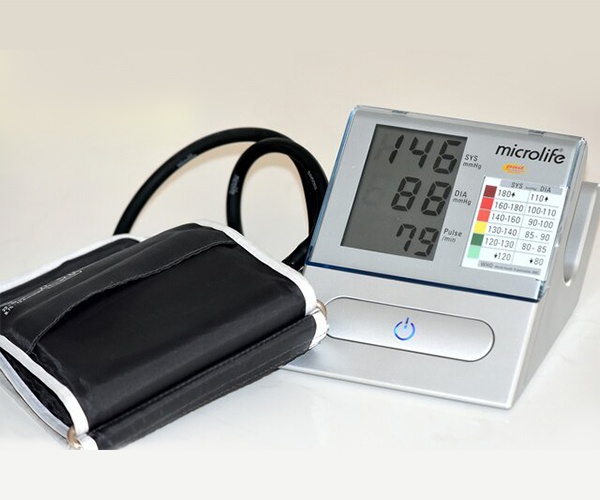15 Ways You Can Lower Your Blood Pressure Naturally

High blood pressure is a dangerous and common condition, it affects 1 in 3 people in America alone. High blood pressure can raise your risk of heart disease and stroke. While there are medications that help with this condition, there are ways to lower it naturally.

15 Natural Ways to Lower Your Blood Pressure
With all these options, there must be a few you can add to your everyday habits.
- Exercise Regularly
Exercise is one of the best ways to lower your blood pressure. It makes your heart stronger and better at pumping blood.
150 minutes of moderate exercise (walking) or 75 minutes of intense exercising (running) a week can lower your blood pressure.
Try walking 30 minutes a day.
- Cut Down on Sodium
Salt is a huge part of our diet, mostly due to processed and preprepared foods. Many studies connect high salt intake with high blood pressure.
If you’re concerned or already have high blood pressure, cut back on sodium. Replace processed foods with fresh ones. You can also use herbs and spices to season your food instead of salt.
- Drink Less Alcohol
Did you know that alcohol can raise blood pressure? It’s connected to 16% of high blood pressure cases around the world.
In America, moderate alcohol intake is defined as no more than one drink a day for women, and two for men.
- Eat More Potassium-Rich Foods
Potassium helps get rid of sodium and eases pressure on your blood vessels.
Foods that have high levels of potassium are:
- Veggies, especially leafy greens, tomatoes, potatoes, and sweet potatoes
- Fruit like melons, bananas, avocados, oranges, and apricots
- Tuna and salmon
- Nuts and seeds
- Dairy
- Beans
- How Much Caffeine Do You Take In?
Before you grab your coffee in horror, hear us out. There’s evidence that caffeine can cause a short-term spike in blood pressure.
There isn’t evidence to prove that it has long-lasting effects.
Though if you think you’re caffeine sensitive, cut back to see if it lowers your blood pressure.
- Managing Stress
When you’re stressed, your body is in constant fight-or-flight mode. That means a faster heart rate and constricted blood vessels.
While easier said than done, try to find ways to relax and break away from your stress.
- Eat Some Dark Chocolate
Before you start gorging, we’re talking about small amounts. Dark chocolate is rich in flavonoids, plant compounds, that make blood vessels dilate.
For the strongest effect, use non-alkalized cocoa powder, which is especially high in flavonoids and no added sugars.
- Lose Weight
Losing weight can make a big difference in heart health. Just losing 5% of your body mass can lower your blood pressure quite a bit.
Losing weight can help your blood vessels do a better job of opening and closing, which makes your blood flow smoother.
- Quit Smoking
Did you know that every puff of cigarette smoke causes a slight, temporary increase in blood pressure? The chemicals in tobacco are known to damage blood vessels too.
So here’s another reason to kick this bad habit.
- Cutting Out Sugar and Refined Carbs
There’s plenty of research showing a link between added sugar and high blood pressure.
Women who drank a single soda a day had higher blood pressure levels than those who didn’t.
A different study showed that having one less sugar-sweetened beverage a day was linked to lower blood pressure.
- Eat Berries
Berries are packed with polyphenols, which are natural plant compounds that are good for your heart. They can reduce the risk of stroke, heart conditions, and diabetes. They can also help improve blood pressure, insulin resistance, and systemic inflammation.
- Meditation and Deep Breathing
While meditation and deep breathing are used to help reduce stress, they also have physical benefits too. They activate the parasympathetic nervous system, which is engaged when the body relaxes. It slows your heart rate and lowers blood pressure.
- Get More Calcium
People with low calcium levels often have high blood pressure. Calcium supplements haven’t been proven to lower blood pressure, but calcium-rich diets are linked to healthier levels.
For most adults, the calcium recommendation is 1,000 milligrams a day. Women over 50 and men over 70 should have 1,200 milligrams.
You can get calcium from collard greens, beans, sardines, and tofu, in addition to dairy.
- Natural Supplements
Some natural supplements can help lower blood pressure.
Aged garlic extract has been used by researchers as a stand-alone treatment and with other conventional therapies for lowering blood pressure.
Berberine, which is usually used in Ayurvedic and Chinese medicine, can increase nitric oxide production, which decreases blood pressure.
Whey protein has been shown to improve blood pressure and blood vessel function.
Fish oil has long been shown to improve heart health and could help with blood pressure.
Hibiscus flowers are rich in anthocyanins and polyphenols that are good for your heart and blood pressure.
- Add More Magnesium
Magnesium helps blood vessels relax. While a deficiency in this mineral is rare, many people don’t get enough of it.
Magnesium is in vegetables, legumes, chicken, dairy products, meat, and whole grains.
Read more here.